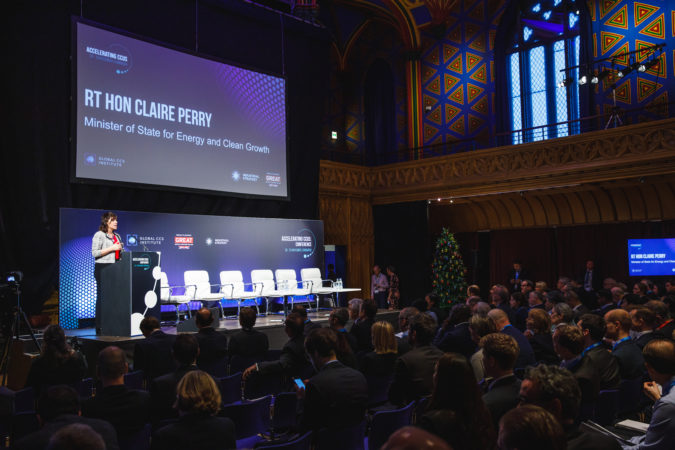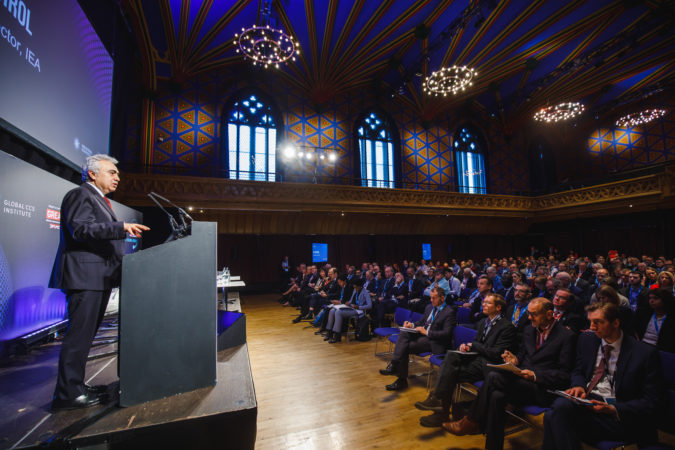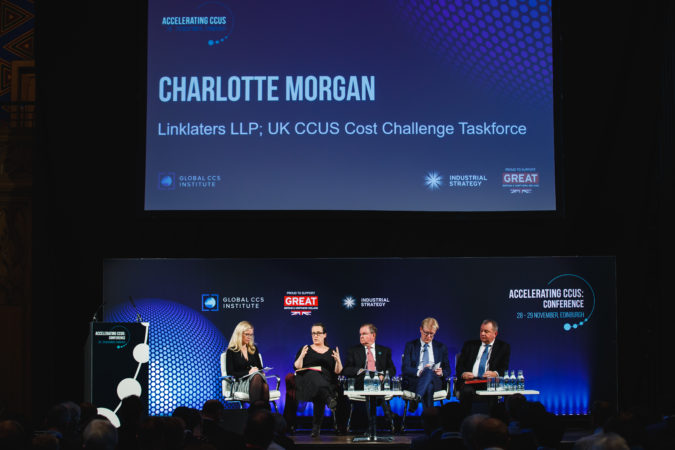Insights and Commentaries
Highlights from the “Accelerating CCUS Conference”
12th December 2018
“CCUS has only one thing going for it – it can save the planet.”
This bold statement by James Smith, co-chair of the UK CCUS Council, was one of the many memorable moments from the Accelerating CCUS Conference.
On November 29, the Institute traveled to Edinburgh to host, together with the UK Government, one of its members, a global conference with the aim of identifying priority actions to scale-up the deployment of CCUS around the world. The conference was part of a series of events organised by the UK Government, following the International CCUS Summit co-hosted with the International Energy Agency (IEA), the day before.
Our conference could not have taken place at a more significant time; just days ahead of the UN Climate conference COP24 in Katowice. Over 350 delegates gathered in Edinburgh, where conversations centered around the value of CCUS for global economies and the sense of urgency around the need to accelerate the deployment of the technology and building supporting infrastructure.
“It’s time to put a rocket booster under CCUS projects”, urged UK Minister of State for Energy and Clean Growth Claire Perry during her opening address. “The main barriers are not technological”, added the Minister. “We must work together to build the frameworks needed to develop CCUS at scale and make it part of a low carbon future.”
[caption id="attachment_5659" align="alignleft" width="675"] Opening address: The Rt Hon Claire Perry MP, Minister of State for Energy and Clean Growth, UK[/caption]
Opening address: The Rt Hon Claire Perry MP, Minister of State for Energy and Clean Growth, UK[/caption]
This was the perfect kick-off to a day full of engaging presentations, insightful exchanges and fruitful discussions. With the UK ready to take the first step on CCUS, as outlined in the Government’s newly published CCUS Action Plan, the main message among delegates at the conference was loud and clear: CCUS is needed to achieve global climate targets and time for action is now!
As we look back at the conference, here are some takeaways from the event:
CCS time has come, and it is here to stay
The conference provided compelling evidence of the renewed momentum around CCUS both in the UK and globally. With speakers from Norway, Japan, Netherlands, China, the United States, UK and Canada, the event reflected the global interest around CCUS as a climate mitigation technology supporting a just transition for communities and industries globally.
“Without CCUS as part of the solution, meeting global climate goals will be practically impossible,” said Dr. Fatih Birol, Executive Director of the IEA during his address. Dr. Birol pointed out that an adequate financial framework is crucial and that over the last 10 years the amount of public funding spent on CCUS globally was less than 3% of government subsidies extended to renewables in 2016.
[caption id="attachment_5660" align="alignleft" width="675"] Dr Fatih Birol, Executive Director of the IEA, addresses the Accelerating CCUS Conference[/caption]
Dr Fatih Birol, Executive Director of the IEA, addresses the Accelerating CCUS Conference[/caption]
The latest findings of the sobering IPCC 1.5 report framed much of the discussions during the day. Professor Jim Skea, co-chair of Working Group III at the IPCCC, presented the findings of the report emphasising that all technologies will be needed to reach our climate ambitions, including CCUS, which can play a significant role in decarbonising the industry sector with high process emissions including steel and cement. Scottish Minister for Energy, Connectivity and the Islands Paul Wheelhouse added that all scenarios 1.5, 2, 3 and 4 degrees need CCUS.
A variety of industries were represented at the event, proving that many industry players are viewing CCUS as a key opportunity in the transition to a low-carbon, competitive economy. Shell, BHP, Carbon Clean Solutions, Port of Rotterdam and Occidental Petroleum among others joined the discussion demonstrating their organisations’ commitment to making CCUS happen globally.
From the United States, Occidental Petroleum President and CEO Vicki Hollub opened the second session of the day presenting enhanced oil recovery as a practical, technology-based solution for lowering the carbon footprint of traditional energy sectors.
From the Netherlands, Mark Driessen from the Port of Rotterdam Authority presented Porthos, a pioneering project aimed at decarbonising energy-intensive industries in Rotterdam’s port area. For the Port, CCUS will be an important building block in their pathway to decarbonisation with the potential to capture and store between 2 and 5 million tonnes of CO2 per year by 2030.
Presenting Norway’s ambition on CCUS, Trude Sundset from Gassnova and Dr. Haugstad from the Norwegian Ministry of Petroleum and Energy introduced their country’s plans to develop a new full-scale CCS project. The two speakers stressed that the full-scale Norwegian project would not only benefit Norway but the rest of Europe. Once the infrastructure finalised, the project will have the capacity to store large quantities of CO2 transported from emission sources from various European countries.
From Japan, Jiro Tanaka from Japan CCS presented the latest achievements of the country’s first large-scale CCS hydrogen demonstration plant Tomakomai. The project aims to develop a full-chain CCS system from source to storage while demonstrating the reliability and safety of CCS technologies. Public and community engagement have been a key priority for the project. Local communities, local government and industries have been involved from the early stages of this demonstration project.
Bringing the voice of environmental NGOs to the table, Dr. Jan-Justus Andreas from Bellona expressed the organisation’s support for the technology: “CCS is not an end in itself but a value to society and our economies.”
Presenting some of the findings of Bellona’s latest report, Dr. Andreas explained the important value for European industries to invest in shared infrastructure and CO2 transport and storage networks. According to the report, such infrastructure could be expanded geographically and open to a multitude of industries, this reducing the costs of decarbonisation and ensuring that industry remains competitive.
For Bellona, there is no doubt that CCUS will be an essential technology to tackle industry emissions.
Strong policy support, new business models and collaboration will be key to advancing CCUS globally
Much of the discussions at the conference echoed the key priorities defined during the International CCUS Summit the day before. The need for clear and long-term policy frameworks to support CCUS business models and drive investment in the technology was repeatedly mentioned during the event. A range of policy options were discussed including the US tax credit 45Q, a piece of legislation introduced to spur investment and help commercialise CCUS in the United States.
At the conference, Steven Winberg, Assistant Secretary for Fossil Energy at the US Department of Energy, also made a strong case for international collaboration explaining that it will be critical to help move CCUS forward.
The concept of “hubs and clusters” was also part of the conversation with the UK and a wave of other European countries seeing it as an economic opportunity to decarbonise while building a sustainable and commercially viable business case for their CCUS projects.
Speaking from a UK perspective, Charlotte Morgan, chair of the UK CCUS Cost Challenge Taskforce, presented some of the recommendations made by UK CCUS Taskforce in their report handed to the UK Government last July. The report fully embraced the hub and cluster approach to accelerate the deployment of CCUS in the UK and suggested to government to explore the use of a regulated asset base model for CO2 transport and storage infrastructure. The UK Government responded to some of the Taskforce recommendations in its CCUS Action Plan released on November 28.
[caption id="attachment_5675" align="alignleft" width="675"] Charlotte Morgan, Linklaters LLP and Chair of the UK CCUS Cost Challenge Taskforce addresses the Conference[/caption]
Charlotte Morgan, Linklaters LLP and Chair of the UK CCUS Cost Challenge Taskforce addresses the Conference[/caption]
Having worked on several UK CCUS projects and developments in the past, Allan Baker from Societe Generale made clear that the financial sector wants to see clear policy on CCUS and without countries clearly demonstrating how CCUS fits in their long-term policies, banks won’t be attracted towards such projects. Baker also added that it is urgent to distill risks around projects and obtain the right balance for all stakeholders involved.
Time to refresh the CCUS narrative and broaden the CCUS community
In the last year, many CCS-related events have called for the need for a renewed narrative around CCUS. The conference in Edinburgh was no different. Within the CCUS community and delegates in the room, it will be important for this reenergised CCUS narrative to highlight the full potential of CCUS for a competitive low-carbon economy. In this narrative, it will be vital to articulate CCUS’ full potential in the creation of new industries and employment and its role maintaining industrial bases and preserving strategic industrial assets.
Speaking on behalf of the International Brotherhood of Boilermakers, Cory Channon explained that his industry understood the value of CCUS as facilitator of quality jobs and an integral part of a new energy economy.
Dr. Julio Friedmann, CEO of Carbon Wrangler, advised the CCUS community to stop talking about CCUS as a technology but frame the CCUS narrative around clean energy and zero emission opportunities. “We should be inviting ourselves into the clean energy discussion,” urged Friedmann. Global CCS Institute CEO Brad Page echoed Dr. Friedmann’s comment saying: “We need to talk about CO2 reduction, not which technology gets how much”.
Time to “Just do it”
Despite the renewed momentum around CCUS, much more needs to be done to scale CCUS deployment in order to achieve net-zero by 2050. Today, there are 23 large-scale CCS facilities in operation or under construction, these facilities can remove 37 million tonnes per annum (Mtpa) of CO2. The Global CCS Institute estimates that the world would need 2500 facilities operating by 2040 to meet global climate targets.
Using the famous Nike catchphrase, Dr. Julio Friedmann urged the audience to take this stance on CCS: “Just do it”.
[caption id="attachment_5662" align="alignnone" width="675"] L-R: Brad Page, CEO, Global CCS Institute; Vicki Hollub, President & CEO, Occidental Petroleum, Prof Jim Skea, Co-Chair of Working Group III of the Intergovernmental Panel on Climate Change (IPCC), Dr Bjørn Haugstad, Director General for the Department of Climate, Industry and Technology, Norwegian Ministry of Petroleum and Energy Dr Fiona Wild, Vice President Sustainability and Climate Change, BHP, Dr Julio Friedmann, CEO, Carbon Wrangler[/caption]
L-R: Brad Page, CEO, Global CCS Institute; Vicki Hollub, President & CEO, Occidental Petroleum, Prof Jim Skea, Co-Chair of Working Group III of the Intergovernmental Panel on Climate Change (IPCC), Dr Bjørn Haugstad, Director General for the Department of Climate, Industry and Technology, Norwegian Ministry of Petroleum and Energy Dr Fiona Wild, Vice President Sustainability and Climate Change, BHP, Dr Julio Friedmann, CEO, Carbon Wrangler[/caption]